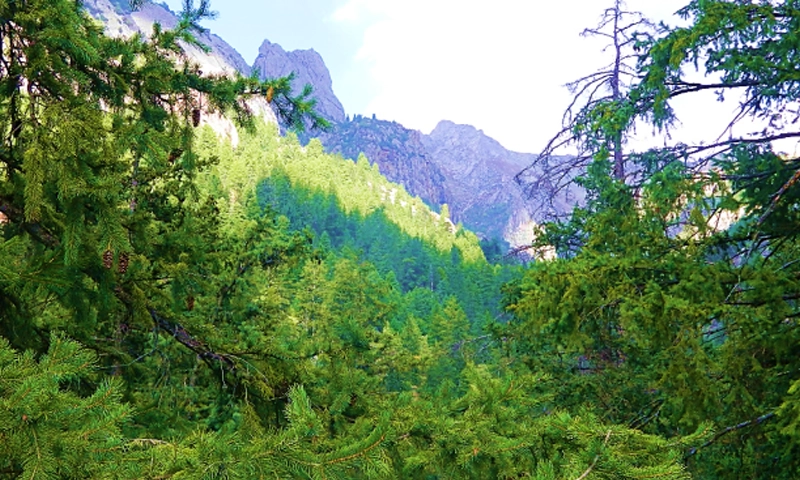- Web Desk
- Feb 24, 2026
G-B CM pushes for divisive forest plan amid climate concerns
-

- Tanveer Abbas
- Jul 27, 2025

GILGIT: As the region is battling with unprecedented climate change-induced floods that have killed at least 10 people and displaced hundreds, G-B Chief Minister Haji Gulbar Khan remains determined to implement a controversial 30-year forest working plan in Diamer’s private forests, based on outdated and disputed data collected nearly three decades ago.
Read more: Pakistan’s resilience tested by rainfall
The plan, approved by the current regional cabinet in October 2024, proposes extraction of an estimated 40 million cubic feet of timber. It could result in the cutting up to 700,000 trees from approximately 10 designated forest zones in Diamer, including Tangir, Darel, Thore, and Khanbari.
Hence, the move has alarmed environmentalists and forestry experts, especially in the context of the region’s increasing vulnerability to climate change-induced disasters.
During the ongoing flash floods triggered by intense monsoon rains, large swathes of Diamer district have been destroyed. It includes the Thore valley — one of the very forest sites marked for commercial logging under the new plan.
Read more: Woman killed as floods continue to wreck havoc in Gilgit-Baltistan
The destruction of infrastructure and agricultural land in these areas has highlighted the critical role forest ecosystems play in protecting mountain communities from such disasters.
However, the chief minister appears undeterred as he has a major share in the plan.
UNSCIENTIFIC
According to sources familiar with the matter, Gulbar Khan is pressing for the immediate commencement of logging operations.
The sources said that key officials from the Forest, Parks and Wildlife Department — including the secretary and additional secretary — refused to participate in a crucial consultative meeting with Diamer stakeholders held earlier this month.
Forest Department insiders describe the working plan as “unscientific and poorly vetted”, warning that it fails to account for climate resilience, ecological sustainability, or even accurate timber stock estimates.
Read more: KP’s strong timber mafia chopping down forests worth billions
The data underpinning the plan was originally gathered in the 1990s and has not been updated to reflect environmental degradation, deforestation, or illegal logging in the area.
Former forest secretary Sumair Ahmed, in a 2022 internal review, had identified at least 18 major shortcomings in the plan and recommended eight corrective measures.
Most of these, including calls for updated forest inventories on scientific bases and ecological assessments, were ignored in the final cabinet-approved version.
CONFLICT OF INTEREST
The sources confirm that two forest tracts slated for tree cutting are registered in the name of the chief minister. In Thore alone — a forest zone recently affected by flooding — more than 100,000 cubic feet of timber has been marked under his name.
One senior official, speaking on condition of anonymity, warned that the plan opens the door to a massive and unregulated timber harvest across Diamer.
“Once the first axe falls, the entire forest stock calculated under this plan will be legally extractable — whether or not it should be,” he said.
Concerns also persist over how timber volumes have been calculated. Pre-felled or illegally harvested timber has reportedly not been subtracted from the current forest inventory, allowing for the possibility that such wood could be laundered into legal trade under the guise of new felling quotas.
“The actual extraction could far exceed the sanctioned 1.4% of existing stock,” the official added.
Meanwhile, environmental groups have called for an immediate halt to the plan and a complete reassessment of Diamer’s forest health.
“The Gilgit-Baltistan government is risking environmental catastrophe by prioritizing commercial interests over sustainability,” said Roshan Din Diameri an Islamabad-based climate activist and journalist from Diamer.
Read more: Climate change boosts wildfire, pest threats to world’s forests: UN report
“At a time when Gilgit-Baltistan is facing repeated climate shocks, including floods and glacial retreats, large-scale deforestation will only deepen local communities’ vulnerability,” he added.
Diameri said it would lead to environmental degradation and increased disaster risk in a district already grappling with flood damage, water shortages, and soil erosion.
“The question isn’t just about trees,” he said, adding, “It’s about the future of a fragile ecosystem — and the lives that depend on it.”
DATA IS ‘GOOD’
During a press conference in Gilgit on Saturday, the chief minister said a ban imposed on the forest working plan in Diamer in 1992 led to illegal forest cutting in the district, which caused destruction of the forests.
“If it had been done legally under a forest working plan, the damage would have been less. If a proper working plan is utilised, it leads to the growth of forests,” he added.
When asked about using non-scientific and outdated 30-year-old data for the present forest plan, and ignoring objections and suggestions proposed by the former forest secretary, the chief minister claimed that the data was neither non-scientific nor outdated, as it had been collected over five years (from 1992 to 1998).
“Currently, our teams visit the compartments where forest felling is going to take place, and after thorough checking, they mark the trees,” he said.
“Sumair Ahmed had presented his proposal at the discussion table for the working plan. The matters related to the forest working plan are not limited to Gilgit-Baltistan. They also apply to Khyber Pakhtunkhwa, Azad Jammu and Kashmir, and Punjab.”
Read more: Trump admin to rescind policy protecting undeveloped US forests
“The Prime Minister of Pakistan has the authority to make final decisions on such matters. Neither Sumair Ahmed has that authority, nor do I, nor do you,” he added.




